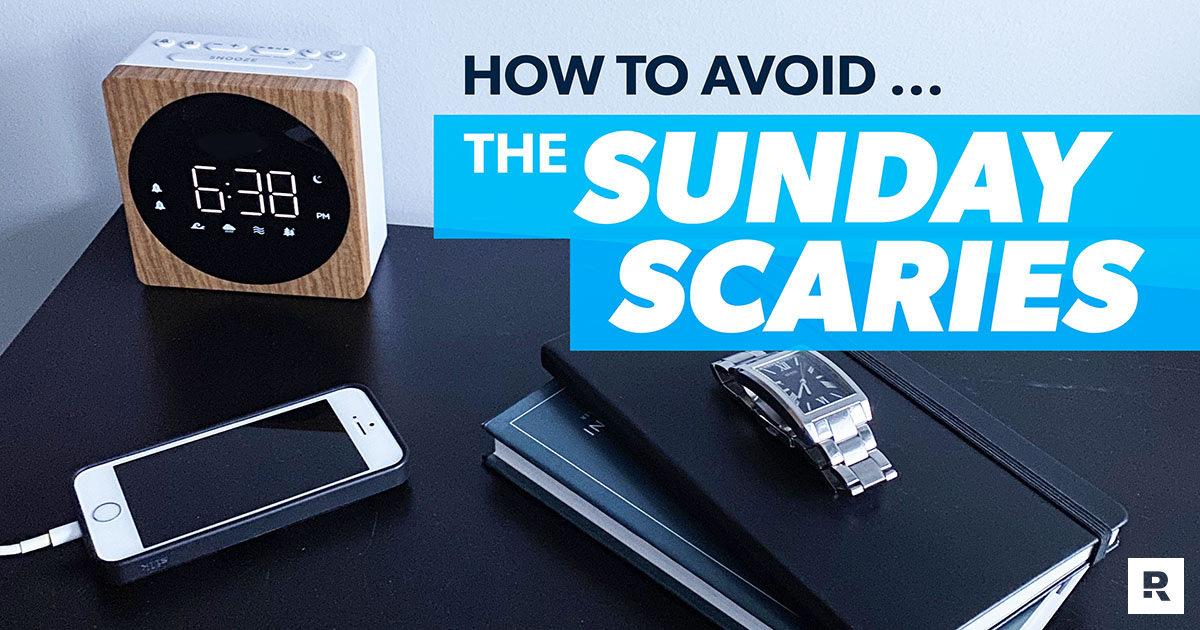Vomiting. Loss of appetite. Depression. Shortness of breath. Insomnia. Wanting to keep on driving past work till you reach Mexico. These symptoms describe many Americans’ Sunday afternoon as they stare down a 40-plus-hour workweek. They’re known as the Sunday Scaries.
Let’s dig into why the Sunday Scaries are even a thing and what you can do about them.
What Are the Sunday Scaries?
The term Sunday Scaries was coined a few years ago, and it describes the panic that sets in on Sunday night as the last precious hours of your weekend slip away before a new workweek.
Basically, the Sunday Scaries are a form of anxiety. My friend Dr. John Delony describes anxiety this way: “Think of anxiety like a smoke alarm. It goes off when it detects a ‘fire’ in your life. The alarms sound when you feel like you’re in danger or have an unpleasant emotion.” And work might be setting off your anxiety alarms.
Along with the others I mentioned earlier, common symptoms of the Sunday Scaries include:
- Panic attacks
- Increased appetite
- Racing heart
- Wanting to avoid work so badly you hope a disaster overtakes you
All these symptoms are often accompanied by a sense of dread about future events and situations you can’t control. And this experience is common—80% of Americans say they worry about their upcoming week on Sundays.1 Did you catch that? 80%!
Folks, there’s a better way to approach a new week. Let’s look at it right now.
Causes of the Sunday Scaries
The first step to beating the Sunday Scaries is figuring out why you have them. See if any of these five reasons seem familiar:
You’re not doing the work you were made to do.
You might think finding your passion is a mythical quest, but trust me: It’s possible. I believe you should wake up excited to go to work. But right now two-thirds of Americans aren’t engaged at work.2 If that’s you, it makes sense you feel dread and anxiety at the thought of Monday. If your work doesn’t light you up, why would you be excited to show up to your job?
You’re in a hostile work environment.
Nobody wants to work in an environment where discrimination, harassment and even abuse are the norm. Even a gossipy, cutthroat workplace with more drama than a reality TV show takes a toll. If you’re in a hostile work environment, it’s no surprise you get hit with the Sunday Scaries.
You’re buried by your responsibilities.
Being overworked will suck the life out of you. The key here is to figure out whether your workload problems are within your control or outside of your control.
- If the problem is your fault, you’re probably saying yes to work when you should say no. Or you’re not managing your time well. Don’t be afraid to sit down with your leader and ask for help prioritizing your work.
- On the other hand, outside circumstances might be dictating your huge workload. Maybe you’ve been assigned too much, or you’ve got a big project to tackle. Respectfully ask your leader something like, “I’m having a hard time keeping up. If I had to pause a project or two, which ones can wait until later?” If nothing changes, it might be time to move on to a place that doesn’t bury you in nonessential work.
Quitting your job might be the right move. To help you out, my team and I created the free Should I Quit My Job Quiz to offer some clarity around this big decision.
Your work isn’t valued.
Maybe your leader doesn’t recognize your hard work, or celebrating wins isn’t a part of your company’s culture. Either way, feeling underappreciated will make it difficult to get juiced about your job. I’m not saying you need endless pats on the back, but without any recognition, it’s easy to feel like what you do simply doesn’t matter. That’s when the Sunday Scaries can set in.
You’re bored out of your mind.
Too much work can drain you—but so can too little work. Without a healthy level of challenge, you’ll be bored, you won’t grow, and you definitely won’t look forward to Monday morning.
How to Beat the Sunday Scaries: 7 Practical Tips
Most of the causes I just listed involve you working the wrong job. In fact, this is the biggest trigger for the Sunday Scaries. If you want to beat this anxiety, you’ll have to get serious about making some changes.
You deserve to win at work. Our new book and assessment will show you how.
This starts with understanding how to get a job you love, then committing to the process it takes to get one.
But finding your perfect job fit isn’t always a guarantee you’ll never face the Sunday Scaries again. You could be doing work you’re wired for, but your boss or teammate could be more toxic than Chernobyl. And some people have formed a habit of stressing out over the coming week, no matter their job or who they work with.
I want you to make intentional choices to win at work, whether you like your current job or you need a new one. So let’s go over some super practical ways to ward off the Sunday Scaries.
1. Delete work-related apps from your personal phone.
Constant alerts and notifications—even just seeing the app icon—will keep you in work mode. Get rid of those office email and chat apps so you can unplug completely.
2. Overcome your fears.
You know what’s at the root of your Sunday Scaries? Fear.
The reality is, you can’t fully eliminate fear. Even when you land the job you’ve always wanted, new fears will pop up. The question isn’t how to get rid of your fears—it’s how to overcome them.
Here are three steps for overcoming your fears:
- Identify the fear. Are your Sunday Scaries caused by a who or a what? Get clarity on the core issue(s) before moving on to the next two steps.
- Deconstruct the fear. Thoughts like you’re not good enough or you don’t have what it takes are lies! You need to pick them apart and recognize the lies—then push past them.
- Refocus on the truth. After deconstructing the fear, you can replace it with the truth. This is important because your beliefs determine your outlook on life. So choose to focus on the truth.
3. Change your mindset.
Speaking of focusing on the truth, your mind is powerful. Instead of getting stuck in a negative rut, change your perspective: Your current job is buying you time until your next opportunity, and you don’t have to stay there forever.
Trust me—I’ve been there. My day job funded my future work for nine years. It took a long time to get to where I am today, but boy was it worth it. Choose to look at your job as a stepping-stone to your next opportunity.
In the meantime, find things to be thankful for right where you are. It will change your mood immediately. At the very least, your job is providing financial stability.
And don’t forget about the professional experience and friendships you’ve formed with coworkers. Even the worst situations can offer something good with the right perspective.
4. Stop negative self-talk.
If you trash-talk yourself a lot about work, you’re throwing fuel on the fire of anxiety. What you say to yourself about yourself is powerful and can keep you locked in a space of stress.3
Try replacing negative self-talk with something positive. If you tend to tell yourself something like, “You’re bad at communicating,” catch yourself and turn it into, “I can do better, and I care about communicating well with people. That’s a good thing.”
5. Plan something to look forward to outside of work.
A fun activity or event doesn’t have to be expensive or big. It can be as simple as watching an episode of your favorite show with your spouse, playing pickleball with your friends, or ordering takeout. You can plan this for Sunday night—or even Monday night. That way you have something to look forward to after the day you’re dreading the most.
If you want to look forward to something professionally, try planning an opportunity to get experience without leaving your day job, like:
- Shadowing someone with a job you’re interested in
- Attending an inspirational or industry-related event
- Launching your side hustle
- Working on a new skill to help you grow in your current job
- Finding a way to serve your community
Being proactive helps you focus on what you’re excited about instead of what you’re anxious about.
6. Connect with someone.
Sometimes being alone can make anxiety feel worse. If you struggle with anxiety on Sunday nights, try scheduling time to hang with a trusted friend, or scope out a networking opportunity to move you toward your goals.
Building relationships and meeting with potential connections will be a much better use of your time than letting the Sunday Scaries simmer.
7. Learn something.
If you’re working a job you don’t like, it’s common to feel stuck. And that feeling will make your dread worse. But knowing you’re working to get somewhere you’re excited about can relieve that stuck feeling.
Getting clarity on what it is you want to do—and educating yourself on how to get there—can relieve anxiety.
Here are some practical things you can start doing this week:
- Listen to podcasts featuring people you admire.
- Sign up for a webinar or class.
- Read books and articles about your industry.
- Get an online certification in your area of interest.
- Attend a workshop in your community.
- Take the first step to apply for college or trade school.
The Long-Term Solution for the Sunday Scaries
For most people, getting rid of the Sunday Scaries permanently means figuring out what they’re meant to do. This can be a challenge, but I’m here to help. Finding fulfilling work is not only possible—it’s what you need to do to kick this anxiety in the pants and look forward to your work.
For help finding the career that’s right for you, take my Get Clear Career Assessment. This 10- to 15-minute assessment will help you clarify and verify your top talents, passions and mission. It will also give you customized results with the best roles and career options for you.
When you learn more about the work you’re wired for, it can help you walk away from the job that’s making you anxious and get one step closer to a job you love. See ya, Sunday Scaries!
Read the full article here

















